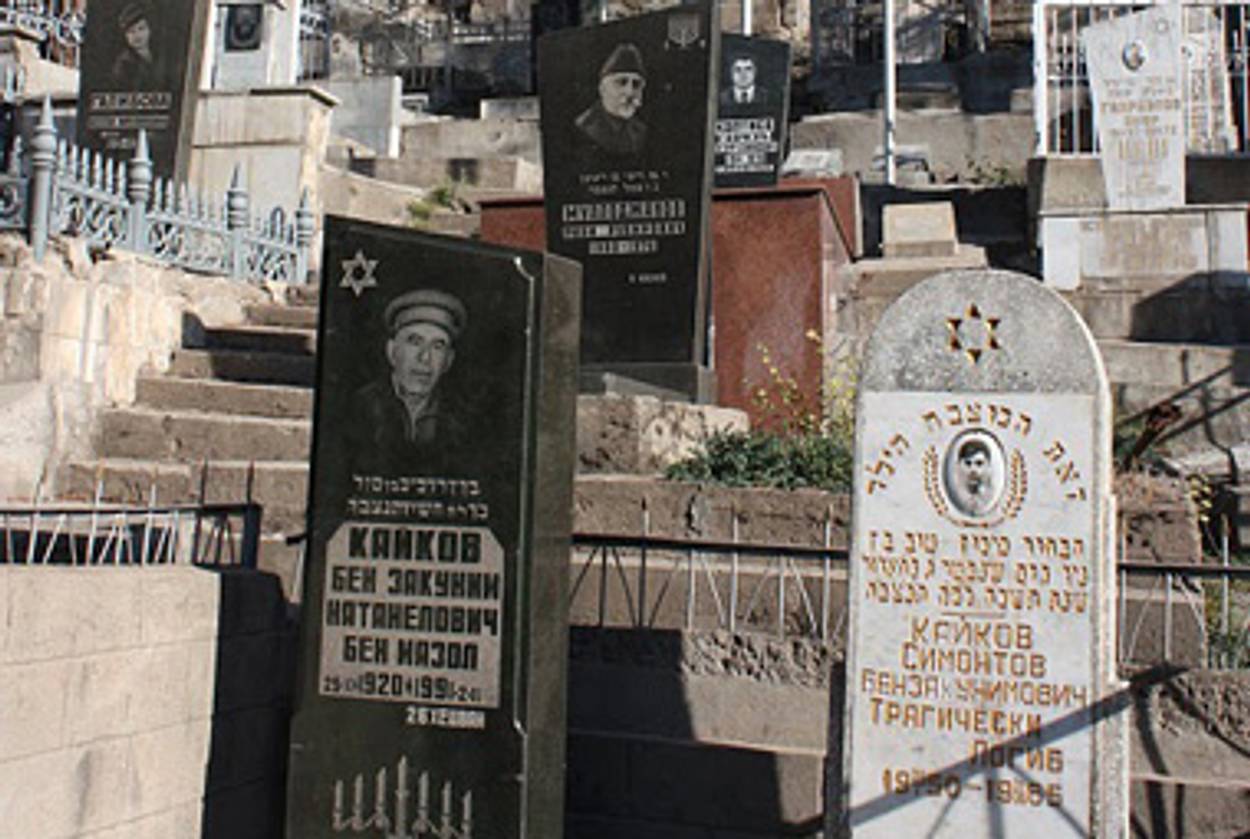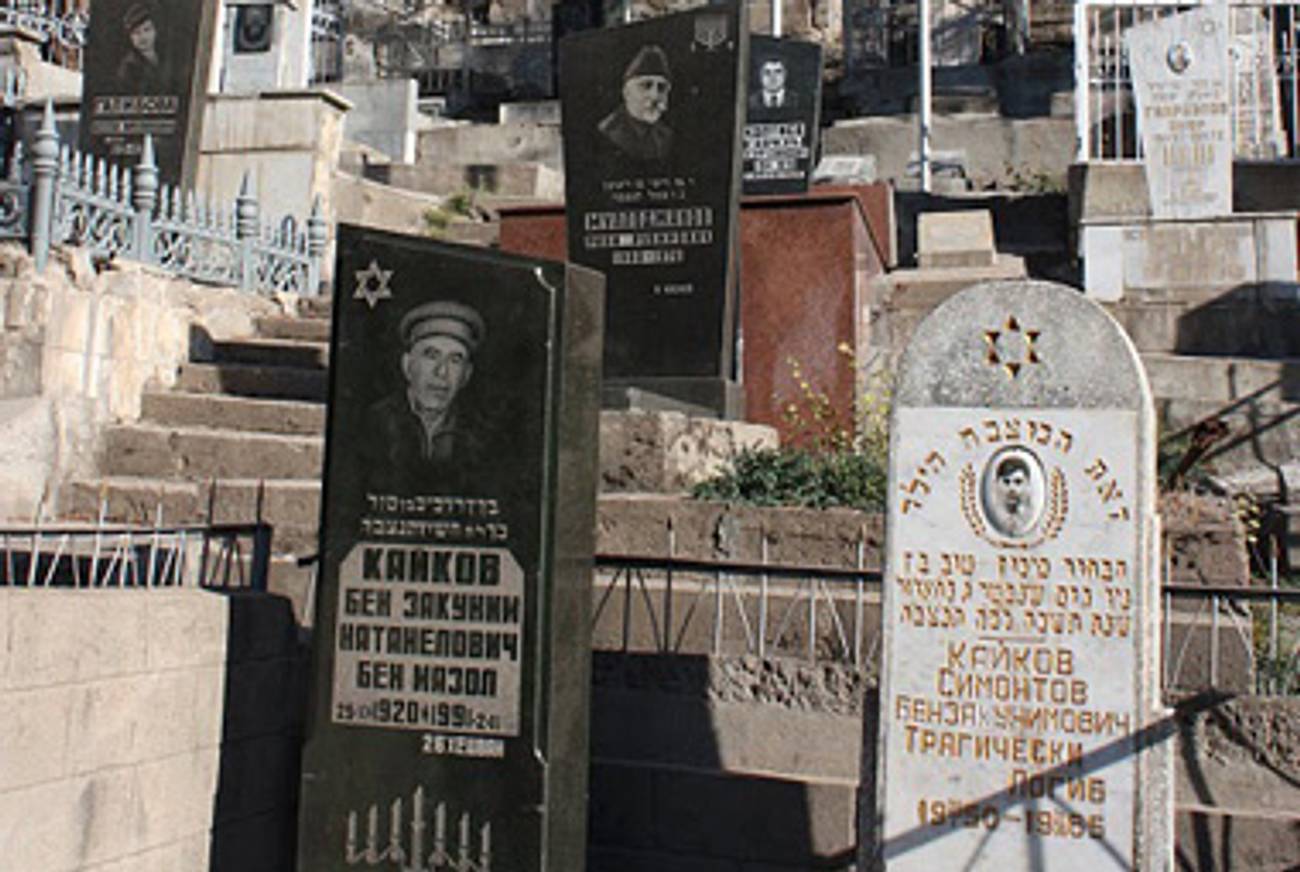Home Stand
Tajikistan was home to thousands of Bukharan Jews, and conditions seemed right for it to stay that way. But the legacy of Soviet persecution and recent Central Asian ties to Iran have made Jewish life more difficult to maintain.




Mikhail Abdurakhmanov, a gaunt, mustachioed man with salt-and-pepper hair and sharp facial features, is the last rabbi in Tajikistan. He greeted me wearily in the courtyard of the country’s only synagogue, located in a crammed neighborhood of the capital, Dushanbe. It opened in May 2009 and is almost impossible to find; for some time, it lacked an actual address, which prevented the Jewish community from officially registering with the government. The building has no Jewish insignia on its exterior and is surrounded on all sides by high security gates. A group of children—some Jewish, some not—play loudly in the alleyway outside.
At its height, in the 1940s, the Jewish community of Tajikistan—a poor, Muslim country in the heart of Central Asia that shares an 800-mile border with Afghanistan to the south—numbered nearly 30,000 people. That population was composed mostly of Persian-speaking Bukharan Jews who had lived in the region for millennia, in addition to Ashkenazi Jews from Eastern Europe who came here (some by choice, others by force) during Soviet times. Today, the Jews of Tajikistan number less than 500, about half of whom live in Dushanbe. These negligible figures are themselves estimates, according to Abdurakhmanov, who is Bukharan. Most of the remaining Jews, he said, do not regularly practice, and many are “mixed,” that is, either the offspring of a Jew and non-Jew or themselves married to a gentile. When I asked if he is able to form a minyan, the quorum of 10 men required for prayer sessions, he replied, “Sometimes.”
Dushanbe’s previous synagogue, built in 1947 and located on a plot of land in the central part of the city where Jews had prayed for centuries, was razed in 2006 to make way for a gaudy, massive, presidential “Palace of Nations.” The destruction of the synagogue did not occur without controversy, although the Jewish community was quick to deny that anti-Semitism had anything to do with the building plans, which also saw the tearing down of a Russian military base and many private residences. The new synagogue is located in a converted house donated by a relative of the country’s authoritarian president, Emomali Rahmon.
With the collapse of the Soviet Union, most Central Asian Jews made a quick exit for Israel, and Tajik Jews were no exception. According to Abdurakhmanov, 12,000 left in the years following the Soviet empire’s collapse, an exodus spurred by the Tajik civil war that raged from 1992 to 1997 and took the lives of 50,000 people. That conflict pitted a shaky coalition of Islamic fundamentalists and democrats against a government composed of former Soviet apparatchiks, and it was settled with an agreement that allowed some opposition figures into parliament. Earlier waves of Jewish emigration occurred in 1917 (the year of the Russian revolution) and in 1948, during Israel’s war of independence.
Like their Muslim countrymen, Tajik Jews faced severe difficulties while living under the Soviet Union, which repressed religious expression throughout the diverse lands it controlled. Jews had to seek permission from the state bureaucracy to celebrate holidays, and in 1946, the city’s three synagogues were nationalized so the government could monitor their activities. And while Abdurakhmanov pointed out that “the authorities have especially good relations with the Jewish community,” he also said that there isn’t much of a Jewish community to have relations with. “It’s very difficult to say that we have a community here,” he told me. “It’s not a community. When you have a Jewish community, you gather together, discuss social issues, attend funerals together, attend weddings together. It’s not happening here.”
***
Since the end of the Tajik civil war, Jewish life in Central Asia has been largely quiet and uneventful. That was until a series of surprising anti-Semitic incidents targeted the small Jewish community of Bishkek, the capital of Kyrgyzstan, following the violent ouster of the country’s dictatorial president in April. Unlike the situations in Uzbekistan and Tajikistan, where Jews have lived for ages and are intrinsic parts of the national culture, Judaism is foreign to Kyrgyzstan, with nearly all of the country’s Jews being ethnically eastern European or Russian. Accusations that a Russian-Jewish businessman had helped the former president’s corrupt son rob the country sparked an attack on the city’s ramshackle synagogue, followed months later by a bombing on the first day of Rosh Hashanah, and saw the rise of an anti-Semitic discourse that foreshadowed the ethnic riots targeting minority Uzbeks two months later, which resulted in the deaths of hundreds and the displacement of 400,000. Since then, a small number of Kyrgyz Jews have made aliyah to Israel.
Tajiks are ethnically Persian, and their language is nearly identical to Farsi. Iran and Tajikistan are close diplomatically, and, as the constant stream of Farsi music videos that seem to play on television screens at every restaurant here attests, Iranian pop culture predominates. But neither the government of Tajikistan nor its people share the anti-Semitism that has become such a crucial feature of the Iranian revolutionary regime, particularly under the rule of President Mahmoud Ahmadinejad. Nor does anti-Semitism figure prominently in the rhetoric of the Islamic Movement of Uzbekistan, or IMU, an al-Qaida-affiliated group that seeks the overthrow of Central Asian regimes and their replacement with Islamic states, and that is alleged to have staged operations within Tajikistan over the past few years.
Reliable information about the IMU, its structure, and size is hard to come by, as it is in the interests of both the IMU and the region’s governments to exaggerate the organization’s importance, the former so it can attract recruits to what it tries to portray as a triumphant cause, and the latter to secure backing from Western governments intent on stamping out Islamic extremism. Earlier this year, an ambush on Tajik security forces alleged to have been perpetrated by the IMU resulted in the deaths of 23 soldiers, leading the Tajik government to launch a months-long security operation in the country’s central Rasht Valley to eliminate what it claims are IMU hideouts. Whatever the apparent success of its recent attacks, however, the IMU is far from posing a serious threat to the stability of the Rahmon regime, and its fundamentalist ideology seems to hold little sway with ordinary Tajiks.
During my visit to Tajikistan in November, I didn’t once hear an anti-Semitic remark or sentiment expressed, either offhand or when I specifically raised the question of Judaism with ordinary Tajiks. Jews have been living in Tajikistan for thousands of years, speak the same language as their fellow Tajik citizens, and appreciate the same cultural mores. Bukharan Jews are physically indistinguishable from non-Jewish Tajiks. Some of the most prominent Tajik figures in culture and the professional world have been Jewish. Tajikistan enjoys diplomatic relations with Israel, and President Rahmon is said to pay regular calls upon New York’s relatively large Tajik diaspora when he visits for the annual United Nations General Assembly. “I don’t feel anti-Semitism, organized anti-Semitism on behalf of the government or ordinary people or organizations,” Abdurakhmanov said. “I haven’t seen any of this.”
This sentiment is echoed by Akbar Turajonzoda, a Tajik legislator and erstwhile foe of the regime. Turajonzoda, whom I met at his office in a small cotton-processing factory in the Bahdat district, 12 miles east of Dushanbe, was once Tajikistan’s Qazi Qalon, or highest-ranking Islamic cleric. “We don’t have any dislike toward Jews,” he told me before going on to explain that whatever anti-Jewish sentiment does exist owes itself to Islamic extremists who use the Israeli-Palestinian conflict to elicit Muslim antipathy toward a convenient target. “There is a very small minority in Central Asia, including Tajikistan, that has some opinions about unresolved issues between Israel and Palestine,” he said. “That small minority consists of some students who have studied abroad and still travel there or have access to certain Internet sites.” (Over the past year, the Tajik government has made concerted efforts to discourage young men from studying at madrassas in Pakistan, Egypt, Iran, and Saudi Arabia.)
But while airing grievances against Israel is a surefire way to generate anger on the Arab Street, Turajonzoda says that similar efforts by the likes of the IMU or Hizb ut-Tahrir, an Islamist organization that seeks the restoration of the caliphate in Central Asia, are unsuccessful. “Our people have so much on their own plates that they don’t think about [Palestinians]; we have far too many pressing issues at home to care about other people’s problems. Besides, our people don’t speak Arabic to follow Middle Eastern [media] coverage of Israeli-Palestinian issues.”
***
Dushanbe’s Jewish cemetery, which occupies several steep hills on the plot of a larger ecumenical burial ground, speaks to a rich history, standing in melancholy contrast to today’s dwindling Jewish presence. A thousand headstones, many of them featuring Soviet-style etchings of the deceased’s visage, dot the landscape. They showcase an erstwhile community of lawyers, doctors, and performers, many of whom, according to my Tajik guide, were once well-known figures throughout the country. The Jewish section is noticeably better maintained than the Muslim and Christian areas of the cemetery, where vegetation crawls over dislodged headstones. The close tending is attributable, I am told, to the full-time caretaker whose salary is paid by Jewish aid organizations and Tajik émigrés. He says that “a lot of visitors” from the Unites States and Israel, relatives of the buried and Jewish delegations, come to the cemetery.
The Tajik attitude toward Jews has an endearingly protective quality to it. “Our Jews,” is how one Tajik woman described her country’s Jewish population, to differentiate Tajikistan’s Bukharan Jews from the rest of the world’s. “Unfortunately, they left for Israel,” a Tajik man explained after regaling me with a list of professions in which the country’s Jews had distinguished themselves during the Soviet era (that sentiment is especially strange to hear in the Muslim world, where Jews have all but disappeared). This evident philo-Semitism, however, was never enough to convince the majority of Tajikistan’s Jews to remain in a place where they were welcome, and it probably will not be long before the country’s Jewish community, unable to form a regular minyan, all but disappears. As I left the Dushanbe synagogue, I asked Rabbi Abdurakhmanov if he presided over bar mitzvahs. “We don’t have children here,” he answered. “How can we have that?”
James Kirchick is writer at large with Radio Free Europe/Radio Liberty and a contributing editor to The New Republic.
James Kirchick, a visiting fellow at the Brookings Institution, is a columnist at Tablet magazine and the author of The End of Europe: Dictators, Demagogues and the Coming Dark Age. He is writing a history of gay Washington, D.C. His Twitter feed is @jkirchick.
James Kirchick is a Tablet columnist and the author of Secret City: The Hidden History of Gay Washington (Henry Holt, 2022). He tweets @jkirchick.